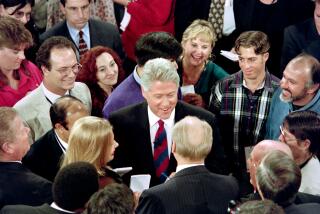Buried Issues
- Share via
The Reagan Administration has managed to put a fresh front on the White House during the past eight years with feel-good imagery and indulgence of popular will, but there is a lot of nasty stuff buried out in the White House back yard. The great deception of the 1988 national election campaign is its blind focus on the White House paint job and its reluctance to dig up any of the ticking time bombs out back.
Congress is not immune, either, and the same comments would apply to the storage sheds up on Capitol Hill.
Even when some of the unpleasant items manage to ooze to the surface, there is no sounding of alarm, no cry for action, no outrage. While the candidates flail at each other over fondness for the flag or prison turnstiles, they ignore little horror stories like $50 billion to fix rotting nuclear-weapons fuel plants and as much as $100 billion to bail out the diseased savings-and-loan industry.
On a day when the nation’s mayors reported that nearly three of 10 urban children live in poverty, more than there were a decade ago, the candidates huffed and puffed over who told more lies in 30-second campaign ads. The 1988 campaign rhetoric sounds as if it came from the best-seller wisdom of Donald Trump, while Stephen King lurks behind the fumes of toxic waste and spins ghostly tales of global greenhouses quietly choking the planet.
One of the worst examples of demagoguery by omission involves taxes, the deficit and Social Security. The debate runs about this deep: Michael S. Dukakis accused George Bush of wanting to plunder the Social Security trust fund to help balance the budget; Bush said that he would never touch the trust fund and never raise a cent of taxes.
Unspoken is the fact that the tax burden on working people is about the same as it was eight years ago, while the wealthy pay relatively less. Increased levies have contributed to a temporary surplus in the Social Security trust fund. The Administration in turn has employed voodoo bookkeeping to use that surplus, and balances in other trust funds, to make the budget deficit appear much better than it is by $100 billion in the past year.
But the debate never gets down to such tiresome details of government, because the modern campaign playbook says that new-age elections are not won by talking about how best to make government work, and to what end. Bush said the other day that the election should be, to some degree, about the will of the American people. Of course it should. But Times political analyst William Schneider correctly notes that Ronald Reagan has created a new political coalition anchored by indiidual voters interested mainly in lower taxes and business interests consumed with deregulation. The political will has been bent to the path of least resistance, to believe that problems can be ignored because they somehow will correct themselves.
Unless the nation’s political leaders level with the public, there will be no demand for dredging up some of those nasty things out in the back yard. Not only is it politically unwise to talk about government solutions, except perhaps for more prisons and gas chambers, it has become slightly un-American even to suggest that there are unresolved issues that can be dealt with only by government. If the leaders ignore the danger signs of topics like $300-million bombers that may or may not work, unrestrained health-care costs and the lack of a national energy policy, the voters will not start asking questions about them or demand that something be done.
This is not a contest for county sheriff or prison warden. The quadrennial election is the one chance that the public has to root around a little in Washington’s back yards and find out what distasteful little matters may have been stashed there in past years. Given the level of this campaign, however, Americans will be forced to sit back and wait for the costly surprises to happen.
More to Read
Get the L.A. Times Politics newsletter
Deeply reported insights into legislation, politics and policy from Sacramento, Washington and beyond. In your inbox twice per week.
You may occasionally receive promotional content from the Los Angeles Times.







